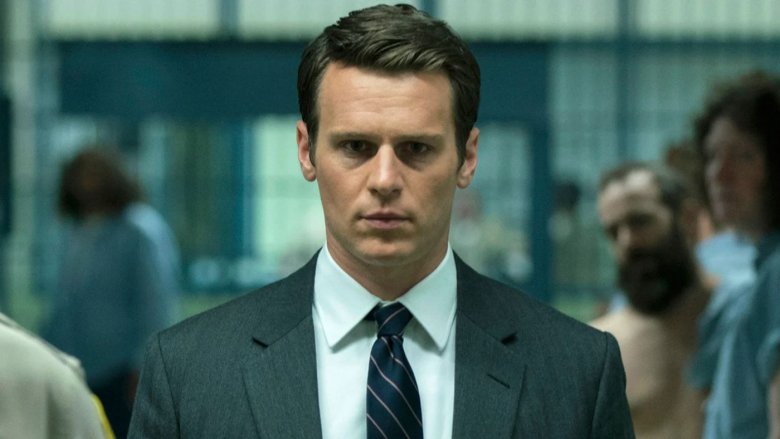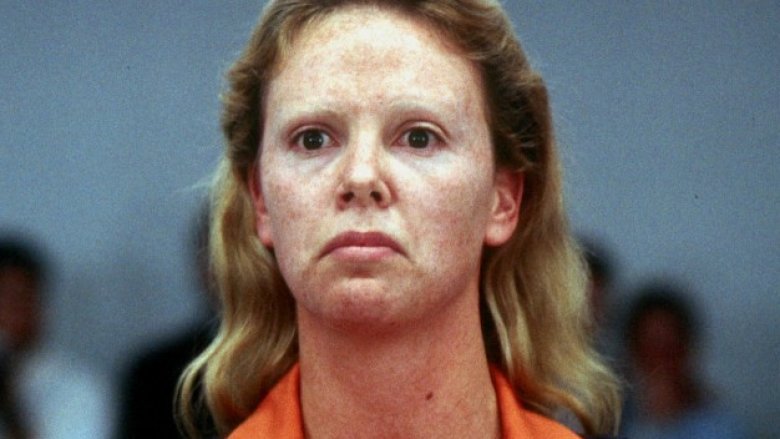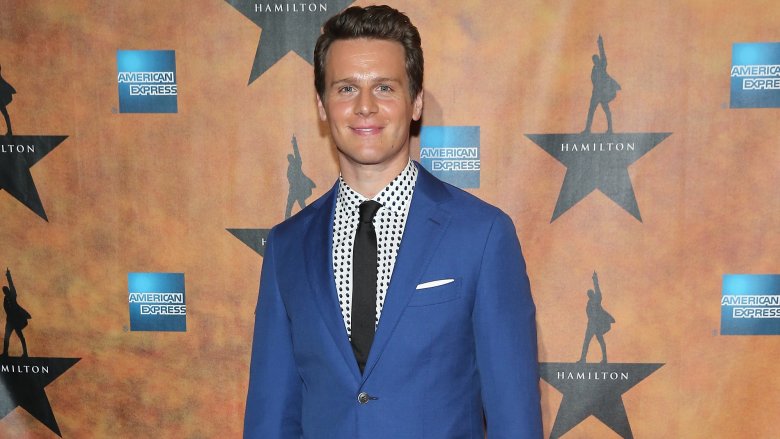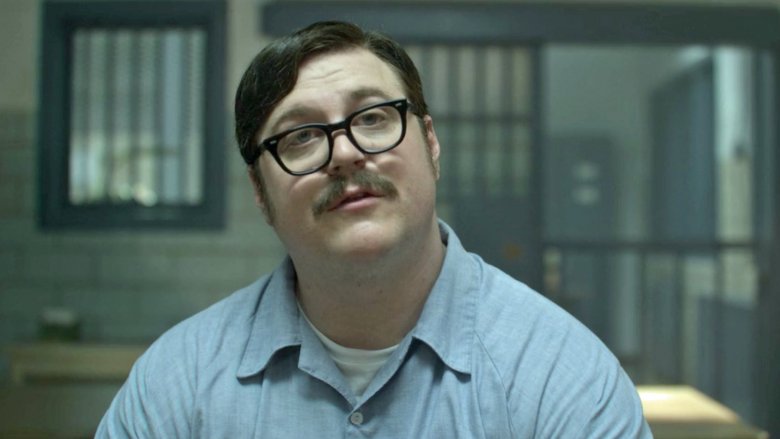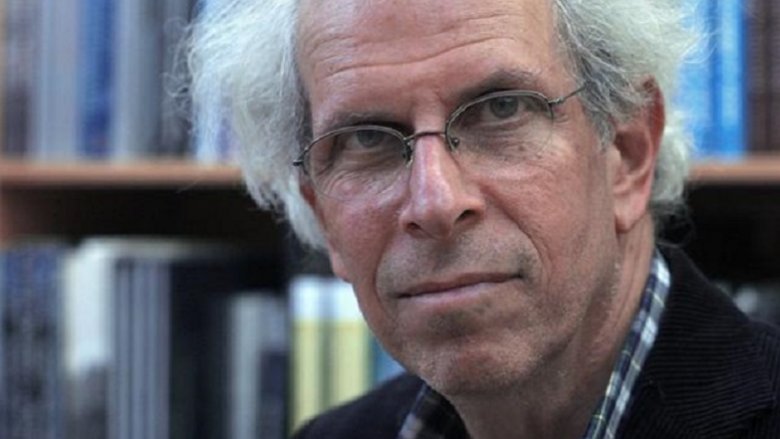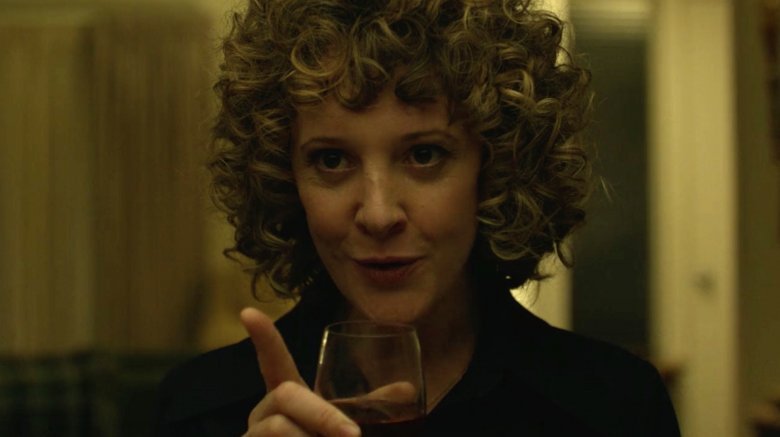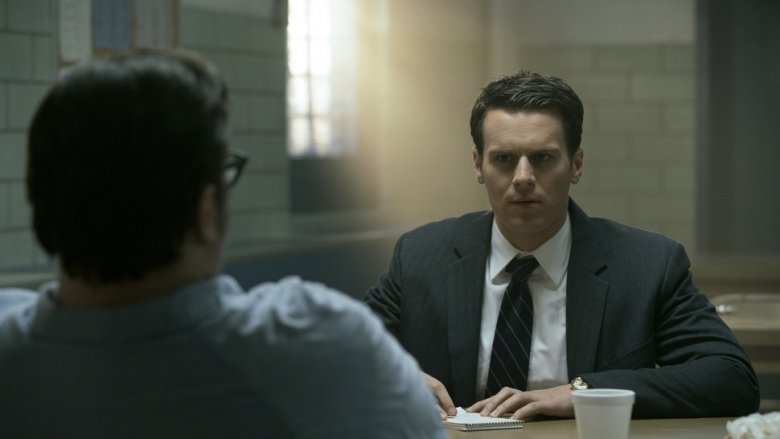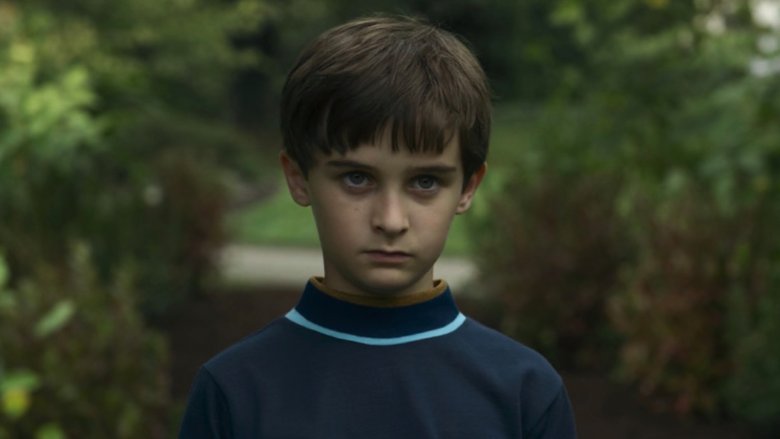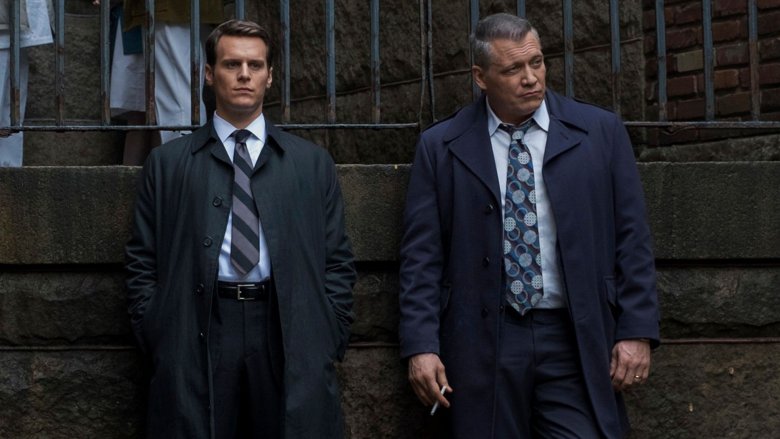The Untold Truth About Netflix's Mindhunter
It's hard to miss all the praise for Netflix's Mindhunter series. The show is based on the 1995 book Mindhunter: Inside the FBI's Elite Serial Crime Unit by John Douglas and Mark Olshaker, and it chronicles the story of Douglas' time spent as an FBI agent. After all, Douglas — along with Robert K. Ressler and Dr. Ann Wolbert Burgess — was a pioneer in the world of criminal profiling, and in an era where everyone is fascinated with true crime, it's no wonder that Mindhunter makes such compelling TV.
With the legendary David Fincher (Seven, Zodiac) holding the reins, the show dives deep into the minds of serial killers and mass murderers, exploring what makes them tick, while also examining the men and women who study psychopaths. Of course, anyone with a Netflix account knows that much about the show. However, there's a lot of intrigue happening behind the scenes, although you don't need to be a profiler to learn all the gritty, gory details. From A-list involvement to real-life tragedies, here's the untold truth of Mindhunter.
Why is Charlize Theron involved with Mindhunter?
If you're not one of those people who skips the credits while watching the show on Netflix, you might've noticed Charlize Theron is listed as one of the executive producers of Mindhunter. But why did she decide to produce this grisly thriller? Well, Theron read John Douglas' book while researching for her role of Aileen Wuornos in the movie Monster. In real life, Wuornos was executed in 2002, having been convicted of murdering seven men from 1989 to 1990, and Theron won a Best Actress Oscar for her amazing turn as the serial killer.
Theron has said (via IndieWire) that she's "fascinated by books on neurology and brain development and why people are sociopaths." Intrigued by Douglas' work, she ended up buying the rights to the Mindhunter. She then immediately thought of David Fincher and asked him to lunch to discuss a possible project together. He was aware of Douglas and his book and was keen to be involved. In development in one form or another since 2009, the show moved from Fox 21 and HBO to Netflix, and in 2016, filming finally began.
From musicals to G-man sociopath
Up until Mindhunter, Jonathan Groff wasn't exactly a household name ... unless you loved musicals and Disney movies. After all, Groff is the voice of Kristoff in Disney's Frozen franchise. Plus, Groff was already a well-known Broadway actor before he was cast as Agent Holden Ford. He's been nominated twice for a Tony award, one in 2007 for Lead Actor in a Musical for Spring Awakening, and again in 2016 as Featured Actor in a Musical for his role of King George in Hamilton.
Speaking of musicals, Groff isn't the only cast member of Mindhunter to come from Broadway. Michael Cerveris, who joined the show in season two as Ted Gunn, the new leader of the Behavioral Science Unit, has also starred in several Broadway productions, winning two Tony awards in the process. In 2007, Cerveris was actually nominated alongside Groff for Lead Actor in a Musical. Both lost out to David Hyde Pierce. But ironically enough, Cerveris is best known for his stage portrayal of Sweeney Todd, the notorious fictional serial killer.
From Co-Ed Killer to narrating Star Wars
One of the killers that Ford and Tench encounter over the course of the show is serial killer Edmund Kemper. Known as the Co-Ed Killer, Kemper is currently serving eight concurrent life sentences at the California Medical Facility State Prison in Vacaville, California, for the ten murders he committed. Among those he killed were his mother and grandmother. Needless to say, Kemper is a nasty piece of business. Not only did he murder his victims, he also dismembered them and violated the remains.
In Mindhunter, Kemper is played by Cameron Britton, and the man is chillingly perfect in the part. Kemper's voice is quite distinctive, and Britton gets it spot on. Interestingly, the real-life Kemper put that voice to good use by recording audio books for the blind. According to True Crime Magazine, Kemper was at one time the coordinator of the Volunteers of Vacaville, a group made up of prisoners who recorded books on tape. He was prolific in his work, reading over 5,000 hours of books. Among the titles Kemper recorded were the novelization of Star Wars and V.C. Andrews' notorious Flowers in the Attic.
Dig that '70s look
The first season of Mindhunter is set in the '70s, and season two is set in the early '80s. These two time periods certainly have a distinctive look, and those vibes are absolutely key to setting the tone of the show. So how did the crew create that period feel?
Well, in an interview with Artsy, cinematographer Erik Messerschmidt says that he and David Fincher were both inspired by the photographs of Stephen Shore (pictured above). Shore's photography from the 1970s had exactly the look the team was going for when designing the series. Shore traversed the United States, taking photos of what some would consider mundane, such as empty streets, parking lots, and restaurants. His pictures depict a sort of loneliness and isolation. Even some of the photographs that show people seem to have a detached coldness, which was exactly what Messerschmidt and Fincher were looking for. Using Shore's photos, the two men collaborated on how they wanted the show to look and created the truly creepy world of Mindhunter.
Wait, who is that?
There are a lot of familiar faces on Mindhunter, and if you've been looking at Nancy Tench and thinking, "I know her from somewhere," well, you're probably right. If you're a fan of the UK version of The Office, then you've definitely seen actor Stacey Roca before. After all, she played Rachel in the second season of the show. Rachel was in a sort of lust triangle between Tim and Gareth, and some of the most cringe-worthy scenes from that series (and there are a lot of them) come when Gareth tries to hit on Rachel. The Office was Roca's first job in television, and since then, she's been in other shows like Waking the Dead, Strictly Confidential, and Bull. Still, she's most closely associated with Mindhunter and The Office, and while these two iconic series are pretty different from each other, Roca is fantastic in both.
What does John Douglas think about Mindhunter?
John Douglas, the inspiration for Agent Ford, isn't shy about what he thinks is wrong with most movies or shows about serial killers. In a 2017 interview with The Philadelphia Inquirer, Douglas talked about the way most movies and television show portray mass murderers, "The way they make the serial killers ... they're like magicians, some of them. And they're so smart. It's just crazy."
When asked what he thinks about Mindhunter and Groff's performance in particular, Douglas said, "I think he's doing a great job". He went on to say that he felt Groff was able to depict the parts of himself that were more low-key when the situation called for it. In the same interview, Douglas added, "And it's great to see the interaction between Jonathan and Holt [McCallany]. ... When they do the interviews, and it's so revolting and then they come out of it, and it's like they're experiencing post-traumatic stress disorder. They just get in the car and they just look ahead. They don't know what to say."
Was the crucifixion crime based on real life?
Agent Tench's adopted son, Brian, has been more than a little weird. Played by Zachary Scott Ross, Brian doesn't talk much. He mopes around the house, doesn't really have any friends, and is generally rather creepy. He only gets animated when asking questions about serial killers, and he has a thing for staring at little girls on swings.
Worse still, in season two, Brian is involved in the murder of a toddler, when he and two older kids lure the little boy back to an empty house. No one knows exactly how it happened, but the child is killed and placed on a make-shift crucifix. Brian isn't charged with the crime, but his parents believe it was his idea to place the child on the cross because he thought it would bring the kid back to life.
Most of the crimes on Mindhunter are based on real cases, so is this story also based in fact? According to Frontline, there was a 1971 murder of a toddler where the child was beaten to death, and his arms and feet were "lashed to a crude wooden cross and covered in paper and debris." Two young brothers confessed to assaulting the child, and the younger brother said he put him on the cross in hopes he would be resurrected. It's a horrible bit of true crime history, and it adds a gruesome layer to the eerie world of Mindhunter.
Not everyone is a fan of Mindhunter
While it seems just about everybody is fascinated by serial killers, there are some who believe the methods and tactics used in programs like Mindhunter are pure hogwash. For example, The Guardian interviewed some of Britain's leading forensic scientists, and these experts didn't mind saying they have little faith in any of the theories John Douglas developed and wrote about while at the FBI's Behavioral Science Unit, saying they aren't really scientifically based.
David Canter, emeritus professor at the University of Liverpool, believes that knowing the day-to-day life of a would-be serial killer is more important than trying to probe their mind for insights, saying "Many forensic pathologists wouldn't let profilers anywhere near investigations they're involved in, because they're often so unhelpful." In fact, he went so far as to say that, "Douglas' writings should be in the fiction section."
Dr. Christopher Clark, a consultant forensic psychiatrist, agrees with Canter, saying it's impossible to know what really motivates someone. As he put it, "I am more convinced than ever we will never know the motivations for that person doing that thing in that way on that day to that person." Clark also takes issue with the interview methods that Douglas used and that are depicted in the show. As Clark elaborated, "Those interviews [held by Douglas] were never properly conducted. Only a very small number of volunteers were interviewed."
The experts believe Douglas' methods are right at home on a fictional show, but they don't reflect how criminal investigations should be conducted. And according to David Canter, "Speculations about the mind of a criminal have never helped a real-life investigation."
